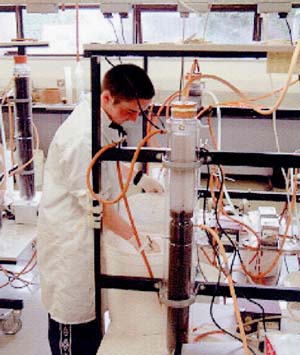| 2004 |

|
YEAR BOOK |
National University of Ireland, Galway
|
Microbiology Research at NUI, Galway
|

Research
The Department of Microbiology is actively involved in both basic and applied research in the areas of biotechnology, environmental microbiology, marine sciences, genetics and bacterial pathogenesis. Many researchers in the Department are postgraduate students and postdoctoral fellows from both Ireland and overseas. Each departmental staff member directs an active research group with research-based MSc and PhD postgraduate positions available each year. Any interested individuals should contact the group leaders directly (further details are on the website at the end of the article). In addition to independent research laboratories, the Department offers facilities for the culture of bacteria, tissue culture, microscopy and microbial fermentation. A range of equipment for molecular and cellular biology allows state-of-the-art molecular, genetic and biochemical techniques to be employed. In addition, the Department also houses the Cytogenetics unit which carries out human chromosome analysis studies.
Ecological and Environmental Microbiology
Ecological and environmental microbiology is the focus of study of the Applied Ecology, Environmental, Marine Microbiology and Microbial Ecology research groups. These studies further our understanding of the essential role microbes play in environmental processes and demonstrate how this knowledge may be put to good use for improving the world around us.
Currently, research is being carried out into the microbial communities which are capable of surviving under enormous pressure in the deep sea. Another area under investigation is the treatment of domestic, agricultural and industrial wastewater by microbes, and understanding how these microbes interact to digest and destroy harmful contaminants present in this wastewater. This research has potential for improving the treatment of sewage by microbial digestion and for the bioremediation of polluted sites.
Microbial Pathogenesis and Diagnosis
Microbial pathogenesis and diagnosis are the emphases of the Bacterial Stress Responses, Microbial Pathogen, Molecular Biochemistry, Molecular Microbiology and Pathogenic Mechanisms research groups. Bacteria involved in causing food poisoning, stomach ulcers and lung infections are being investigated in order to provide information that could lead to improved human health. Recent work has determined the structure of the bacterial molecule lipopolysaccharide from several pathogenic bacteria, and the influence of the structure on the ability of this molecule to stimulate the host immune system. Biotechnology research has established accurate, rapid molecular methods based on cellular RNA content to identify microbes infecting patients. These studies will aid in the development of improved diagnostic tools and more effective preventative and therapeutic medical treatments.

Teaching
Undergraduate students at NUI Galway have the opportunity to study various aspects of microbiology throughout their years in college and, on average, forty students graduate each year from the Department of Microbiology with a BSc honours degree. The Department also directs a denominated BSc degree in Environmental Science, and is active in the teaching of two other denominated BSc degrees, Biotechnology and Marine Science, as well as lecturing to students in the Faculty of Medicine.
Two taught postgraduate courses are offered by the Department, leading to a Higher Diploma in Applied Science (Microbiology) and to a MSc in Biotechnology. These courses aim to provide participants with a thorough training in analytical and research techniques, and with experience of the practical application of these techniques in industry. In addition, courses are available in business, management and marketing. The MSc course also includes a laboratory based research project and a work placement in an industrial setting. As a result, these courses provide high calibre graduates who are specially trained to meet the up-to-date requirements of many of the biotechnology, pharmaceutical health care, and food based industries.
Contact: Professor Jim Houghton, Department of Microbiology, National University of Ireland, Galway;
Tel: 091-512023; Fax: 091-750598;
E-mail: [email protected] ; Web: www.nuigalway.ie/microbiology/